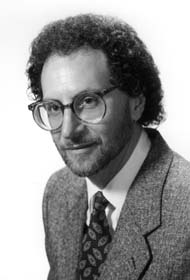![]()
Departments
![]()

|
16 July 1999 |
Vol. III, No. 2 |
Feature
Article
Historical Society takes root
By Eric McHenry
Louis Ferleger is a historian whose job is to be forward-looking. As executive director of the Historical Society, a new scholarly association housed at BU, Ferleger says that building an endowment is among his first priorities.
"I'm going to be working very hard for the next couple of years to raise money," he says. "If you were to look at the financial statements of the other historical associations, the American Historical Association [AHA] and the Organization of American Historians [OAH], you'd see that they have very large endowments that enable them to sustain themselves during good and bad times."
|
|
|
Louis Ferleger
|
The conference drew 500 of the society's approximately 1,200 members to BU. Although early interest in the organization has been strong, Ferleger does not expect member dues to keep its coffers full.
"Our dues structure is quite reasonable," he says. "It's $10 annually for students, whether undergraduate or graduate, and $20 for faculty irrespective of rank, which is different from the dues structures of those other organizations."
The Historical Society first sprang up in early 1998, as many academic historians began seeking an alternative to the AHA and the OAH. There is a widespread perception, Ferleger says, that within those organizations the search for historical truth has increasingly been made subordinate to identity politics and revisionism -- scholarship undertaken with good intentions but in bad faith.
"We want to organize in a way that stimulates intellectual exchange more than do those other organizations," says Ferleger. "More importantly, we want to recover important subdisciplines, such as military history and economic history, which have been, for whatever complicated reasons, neglected by those organizations."
The proceedings at the inaugural conference, according to CAS Professor of History Robert Dallek, were in keeping with those objectives. The early performance of the society, he says, augurs well for its long-term success.
"This society is very quickly off the ground, and it had a very good first meeting," says Dallek. "I think it's steering clear of the political correctness that has become so much a hallmark of the other two associations. And I think people are eager for that. I certainly am. We don't need this evangelical push toward a narrowing or uniformity of perspective. I'm very pleased that the history profession has diversified over the years, but one shouldn't throw the baby out with the bathwater by neglecting such subjects as presidential history, intellectual history, and military history."
Ferleger, an expert on American economic history, comes to BU from UMass-Boston. His position is tenured and includes a small teaching load within the history department in addition to his directorial duties at the society. Having served over the past 10 years as a professor, department chair, and associate dean, he brings necessary administrative and academic experience.
"The trick was to get someone who had outstanding administrative credentials, but who would also meet the teaching needs of the department," says William Keylor, CAS professor and chair of the history department.
He adds that the appointment of Ferleger, who describes his political views as "eclectic" and is viewed by many as left-leaning, flies in the face of claims that the society was created to serve as a conservative antidote to the AHA and the OAH. Most of its early benefactors have been foundations known for their support of conservative entities, and many of its executive committee members and governors, such as Gertrude Himmelfarb and Donald Kagan, tend to the academic right. But liberal scholars are also generously represented in its leadership.
"The Historical Society has been under suspicion in some quarters as a narrow, ideological organization," Keylor says. "And I think the appointment of Lou Ferleger is a further indication that it is in fact catholic with a small c. He is by no means identified with any hard-line neoconservative tradition."
Dallek, who served as his department's representative on the search committee that found Ferleger, adds that their choice "bridges the various political constituencies.
"But of course we were less intent on settling any political question than on getting a high-quality teacher, scholar, and administrator," he says. "That has to be the focus of any such professional search."
The search committee also recently selected Kirse May, a historian who has just completed her Ph.D. at the University of Utah, to be the society's associate director. She will join Ferleger in the administrative office on August 1.
For more information about the Historical Society, call 358-0260 or visit its Web site at www.bu.edu/historic.
